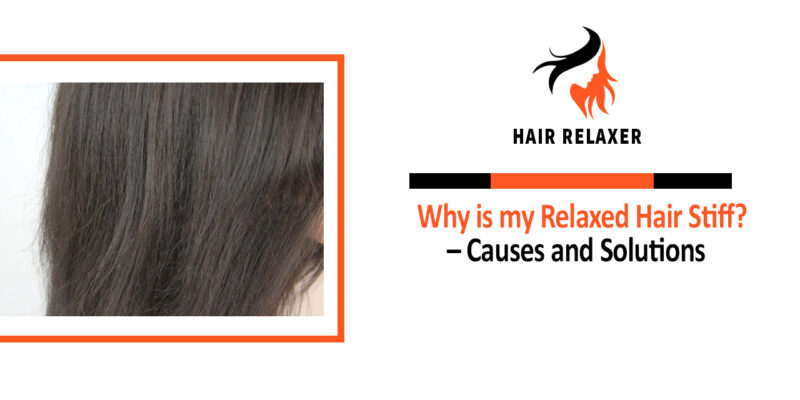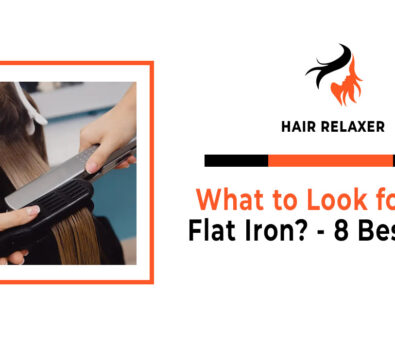Have you ever wondered why your once silky and smooth relaxed hair has suddenly become stiff and unmanageable?
The frustration of dealing with stiff hair can be overwhelming, leaving you questioning what might be causing this undesirable change.
Fear not!
In this informative guide, we will go into the depths of this issue and explore the potential reasons behind the stiffness in your relaxed hair.
Relaxed hair, often achieved through chemical treatments to straighten curly or oily hair, requires special care and attention to maintain its lusciousness.
However, despite your best efforts, you may find your hair losing its natural suppleness, leaving you longing for the softness you once cherished.
Understanding the root causes of this stiffness is essential to reclaiming the vitality of your hair.
In this article, we are going to uncover the possible culprits behind stiff relaxed hair. We will explore factors such as improper moisture balance, inadequate conditioning, over-processing, and product buildup.
Additionally, we will provide expert tips and practical solutions to help you restore the softness and flexibility you desire.
By gaining insights into the reasons behind stiff relaxed hair, you will be equipped with the knowledge to make informed decisions about your hair care routine.
Keep reading!
What Does the Mean of Stiff Hair?
Stiff hair refers to hair that lacks flexibility, feels rigid, and is resistant to movement or manipulation. When hair becomes stiff, it tends to lose its natural bounce and suppleness.
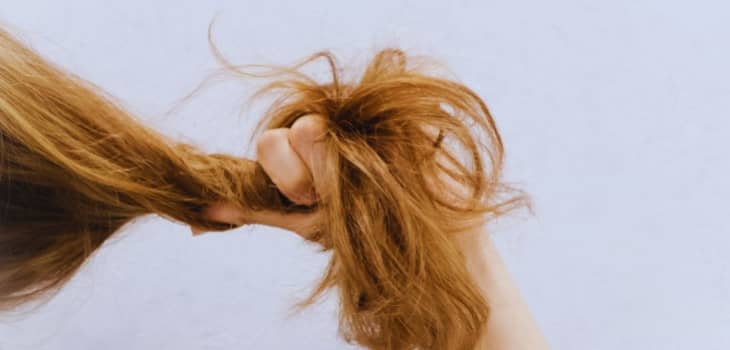
Instead of flowing and moving freely, it may feel dry, brittle, and unyielding. Stiff hair can be problematic as it becomes challenging to style, manage, and maintain its desired shape.
Reasons behind Hair Stiffness
There can be various reasons behind hair stiffness. One common cause is a lack of moisture, which can result in dry and brittle hair strands.
- Over-processing, such as excessive use of chemical relaxers or harsh styling treatments, can also contribute to hair stiffness.
- Inadequate conditioning, infrequent deep conditioning, or using the wrong hair care products can further exacerbate the issue.
- Stiff hair can also occur due to product buildup, where residue from hair care products, oils, or pollutants accumulates on the hair shafts, making them feel stiff and weighed down.
- Environmental factors such as excessive sun exposure, heat styling, or exposure to harsh chemicals can contribute to hair stiffness.
Addressing the underlying causes of stiff hair through proper hair care, hydration, conditioning, and adopting a gentle styling routine can help restore its natural softness, flexibility, and manageability.
Why is my Relaxed Hair Stiff?
There can be several reasons why relaxed hair becomes stiff. Here are some common factors that can contribute to stiff hair after the relaxing process:
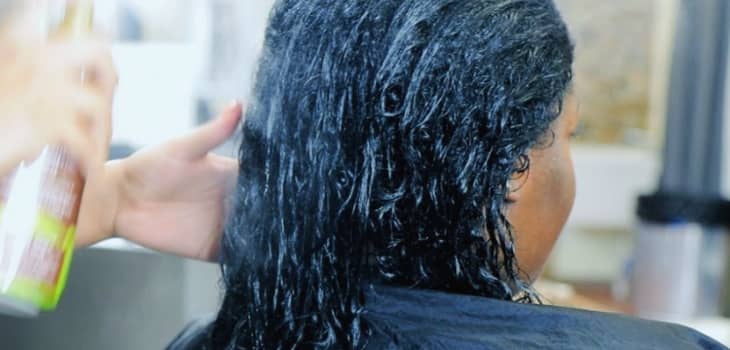
Over-Processing
If the relaxer is left on the hair for too long or if relaxer applications are done too frequently without giving the hair enough time to recover, it can lead to over-processing. Over-processing damages the hair structure, causing it to become dry, brittle, and stiff.
Improper Neutralization
After applying a relaxer, it is crucial to thoroughly neutralize the hair to stop the chemical process. If the neutralizing step is not performed correctly or is skipped altogether, residual relaxer left in the hair can continue to process, resulting in stiffness and damage.
Lack of Moisture
Relaxed hair tends to be more prone to dryness because the chemical process can disrupt the hair’s natural moisture balance. Insufficient moisture in the hair can make it stiff, brittle, and less flexible. Proper hydration is essential for maintaining the softness and manageability of relaxed hair.
Inadequate Conditioning
Relaxed hair requires regular conditioning to replenish moisture, nourish the strands, and maintain elasticity. Without proper conditioning, the hair can become dry and stiff over time.
Product Buildup
Accumulation of product residues, such as heavy oils, gels, or excessive styling products, can weigh down the hair and make it stiff. Failure to clarify or cleanse the hair effectively can lead to product buildup, hindering its natural movement and flexibility.
Environmental Factors
Environmental factors like exposure to harsh weather conditions, excessive sun exposure, or chlorinated water can contribute to dryness and stiffness in relaxed hair.
How to Treat and Fix Stiff Hair?
Treating and fixing stiff hair requires a combination of proper hair care practices, nourishment, and targeted treatments. Here are some effective steps to help treat and restore flexibility to stiff hair:
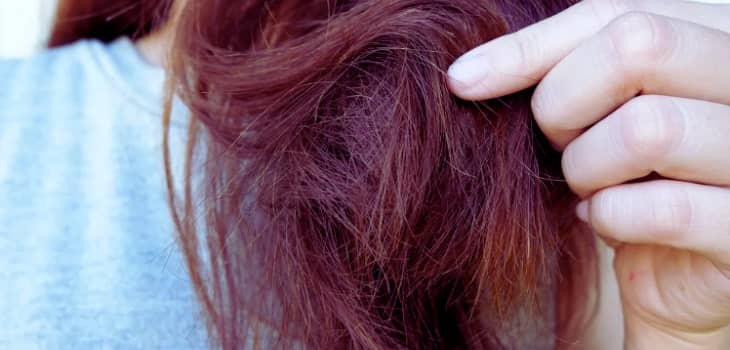
Moisturize Regularly
Moisture is key to combatting hair stiffness. Use a moisturizing shampoo and conditioner specifically formulated for relaxed or chemically treated hair.
Incorporate a deep conditioning treatment into your routine at least once a week to provide intense hydration and nourishment. Consider using moisturizing leave-in conditioners or hair masks to help retain moisture between washes.
Protein Treatments
Stiff hair may indicate a lack of protein. Incorporating protein treatments periodically can help strengthen and restore the hair’s structure.
However, be cautious not to overuse protein treatments, as excessive protein can lead to further stiffness. Find a balance between moisture and protein treatments based on your hair’s needs.
Gentle Detangling
Use a wide-toothed comb or a detangling brush to gently detangle your hair, starting from the ends and working your way up. Avoid harsh brushing or combing that can cause breakage and further damage to the hair.
Avoid Heat Styling
Minimize the use of heat-styling tools like flat irons, curling irons, and blow dryers, as they can contribute to dryness and stiffness. If you must use heat, apply a heat protectant spray and use the lowest heat setting possible.
Trim Regularly
Trim off split ends and damaged hair regularly to prevent further breakage and maintain the overall health of your hair. This will help eliminate any dry and brittle sections that contribute to stiffness.
Protective Styling
Consider protective hairstyles such as braids, twists, buns, or updos that minimize manipulation and protect the hair from environmental factors. These styles can help retain moisture and reduce stress on the hair, promoting healthier and less stiff hair.
Avoid Using Hot Water for Hair Wash
Hot water can strip the hair of its natural oils, leaving it dry and contributing to stiffness. Start by wetting your hair with lukewarm water, then apply a moisturizing shampoo specifically designed for dry or damaged hair.
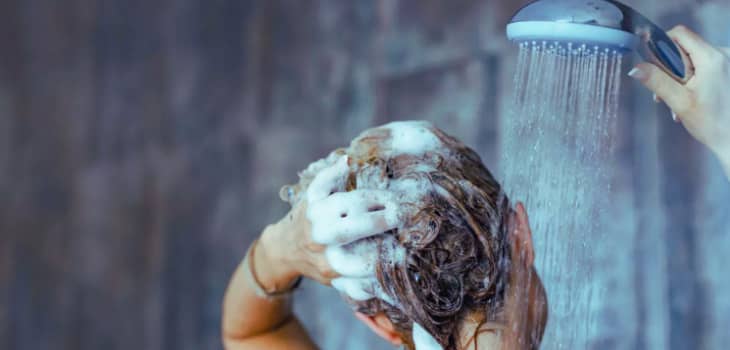
When conditioning, choose a rich, hydrating conditioner and apply it from mid-length to the ends of your hair. Leave the conditioner on for a few minutes to allow it to penetrate the strands. Rinse your hair again with cool water to seal the cuticles and retain moisture.
Air Drying Your Hair
Heat styling tools like blow dryers and flat irons can strip moisture from the hair, leading to stiffness. Opting for air drying instead can help retain moisture and reduce dryness. After washing your hair, gently squeeze out excess water and allow it to air dry naturally.
Protecting from the Sun
Exposure to the sun’s UV rays can cause damage to the hair, leading to dryness and stiffness.
Shield your hair from direct sunlight by wearing hats, and scarves, or using UV-protective hair products. This will help prevent UV-induced moisture loss and keep your hair hydrated.
Minimizing Hair Color Treatments
Frequent hair coloring or chemical treatments can weaken the hair and contribute to stiffness.
Consider reducing the frequency of hair color treatments or opting for gentler, less damaging alternatives like semi-permanent dyes or natural hair dyes. Giving your hair sufficient time to recover between color treatments can help maintain its natural elasticity and softness.
Deep Conditioning Treatments
Incorporate regular deep conditioning treatments into your hair care routine. Deep conditioners are formulated to provide intense hydration and nourishment to the hair, helping to combat stiffness and dryness.
Look for deep conditioning products specifically designed for relaxed or chemically treated hair, and leave them on for the recommended duration to maximize their benefits.
Why is my Relaxed Hair Stiff?- FAQs
Conclusion
This article sheds light on the common issue of stiff relaxed hair and provides valuable insights into its causes and potential solutions. The expertise of professionals and their experiences play a pivotal role in guiding individuals facing this challenge.
By exploring the reasons behind hair stiffness and hardness, such as overprocessing, lack of moisture, improper neutralization, and product buildup, readers gain a deeper understanding of the factors contributing to their specific hair condition.
As a professional hair artist, I always refer my clients to get regular hair touch up after 5 to 6 weeks which is helpful for healthy growth of hair because of regular trimming the splits will cut out and new roots will be dyed again which remains your beautiful fresh and attractive.
Are you ready to adopt a magically attractive look?

